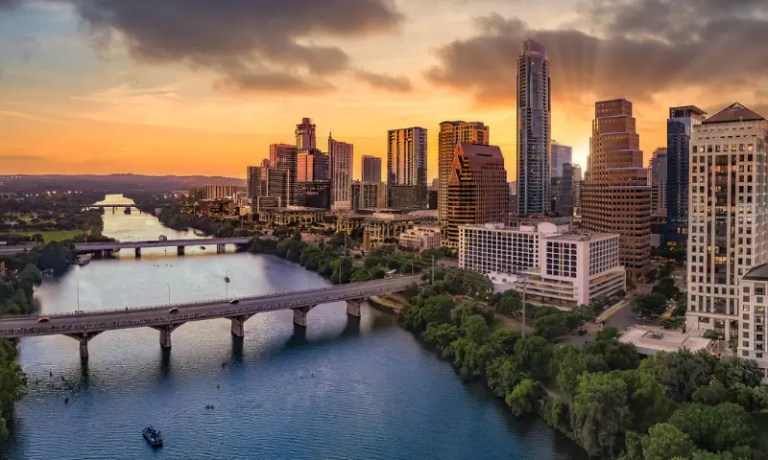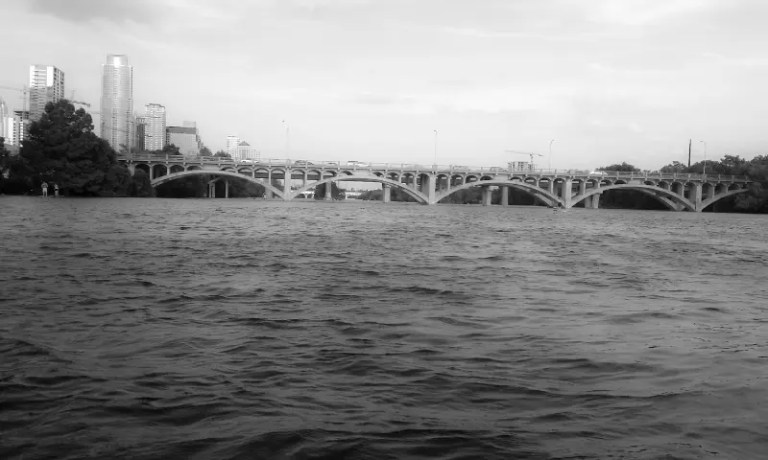The real cost of bottled water.
See how our bottleless water coolers compare.
Areas served
Areas served
Fill out this form or call 844-303-2841 to speak to a local Culligan Quench water expert. Fields marked * are required.
Offer a more sustainable solution for cleaner, better-tasting water on demand.
Fast, efficient, and reliable ice and water machines with advanced filtration.
Bottomless bubbles with built-in filtration for your modern workplace.
Better water makes better coffee. Give your people great-tasting coffee from best-in-class brewers.


Today, Austin supplies its water from the Lower Colorado River as it flows through Lakes Travis and Austin. The city’s two wastewater treatment plants, Walnut Creek and South Austin Regional, treat up to 150 million gallons per day of sewage before returning it to the Colorado River. Austin also has three water treatment plants, Handcox, Davis, and Ullrich, that treat water from the Colorado River to supply the city with safe drinking water.
Similar to other Texas cities, Austin struggles with hard water issues from mineral contaminants. In addition, Austin’s Ullrich Water Treatment Plant received a violation in 2022 for combined filter effluent turbidity. Turbidity measures the cloudiness in water and may indicate the presence of disease-causing organisms such as bacteria, viruses and parasites. To receive fresh drinking water free of contaminants, Culligan Quench offers the best bottleless dispensers in Austin. Not only do these systems purify the existing water supply, they also help protect the environment and reduce plastic waste by supplying Austin bottleless machines.
At the time of its founding in 1839, Austin had under 1,000 residents with no water or sewer system. The city sourced its water from rainwater and wells, or by transporting it by wagon from the river in barrels. Austin water quality saw remarkable improvement in 1871 when the first organized water system began pumping from the Colorado River.
1893 saw the completion of the 60-foot high Austin Dam to provide affordable hydroelectricity. However, in 1900, a disastrous failure of the Austin Dam flooded and destroyed parts of the city. The city’s first wastewater treatment was built in 1919. At that time, a simple chemical treatment used lime to treat river water. Later, in 1937, the city built a new wastewater treatment plant using activated sludge to improve Austin water quality.
Talk to an Austin Culligan Quench water expert to find the best water solution for your space.
See how our bottleless water coolers compare.
Backed by 85 years of Culligan expertise, Culligan Quench has focused exclusively on providing businesses with the highest quality filtered water. This commitment to doing one thing well has made us the trusted water authority for over 75% of the Fortune 500. We offer the best bottleless water coolers, ice machines, sparkling water dispensers, and coffee brewers to fit any workplace. No matter your location, company size, or industry, we have a filtered water solution that is right for you
Play videoProudly providing businesses with clean, filtered drinking water in the greater Austin Metro Area.
| Mon: | 8 AM – 8PM |
| Tues: | 8 AM – 8PM |
| Wed: | 8 AM – 8PM |
| Thur: | 8 AM – 8PM |
| Fri: | 8 AM – 8PM |
| Sat: | Closed |
| Sun: | Closed |
Austin has safe drinking water. Drawn from Lake Travis and Lake Austin, the water is treated to remove contaminants in compliance with regulatory guidelines. Water is tested daily at the city’s three water treatment plants and in more than 300 samples taken monthly throughout the distribution system. There are little to no detectable levels of manmade per- and polyfluoroalkyl substances (PFAS) in the local water supply, according to Austin Water’s Quality Report.
While it’s fine to drink Austin tap water, water dispensers and ice machines are a convenient option in the workplace. Employees can quickly access fresh-tasting cold water and ice, which many staff members appreciate during hot Texas summers.
Austin’s water is considered moderately hard, with an average of 114 milligrams per liter (mg/L) of calcium carbonate, according to the city’s water quality reports. This is close to the upper threshold of the hardness category, which ranges from 61 to 120 mg/L. Minerals in hard water make it harder to lather soap and can leave limescale buildup in pipes, faucets and appliances.
Water hardness isn’t a health issue, but businesses may want to provide alternatives to plain tap water to enhance the employee experience. Bottleless water coolers, sparkling water dispensers and coffee brewers are considered workplace features.
Algae can bloom in warm waters, including Lake Austin and Lake Travis, giving the lake water a green appearance. Some algae can produce cyanotoxins, which are harmful to human and animal health. Austin Water monitors for these substances in raw lake water, removing toxins during the filtration and disinfection process to ensure your tap water is safe. In rare instances, tap water may be green because of copper pipes in your plumbing system. Contact Austin Water if you have concerns about the color of your water supply.
To provide clean, safe drinking water at your office, use the Culligan Quench product finder to find water coolers that provide advanced filtration of Austin water, hot or cold.
Over 120,000 companies, big and small, trust Culligan Quench for cleaner, safer, and great-tasting water.
Ready to upgrade
your water?Get matched with the best water, ice, sparkling water or coffee machine for your workplace.
Take our quiz